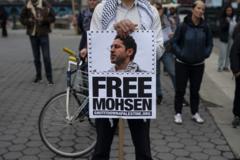Mohsen Mahdawi, a Palestinian activist and philosophy student at Columbia University, was arrested by US Immigration and Customs Enforcement (ICE) during a scheduled citizenship interview, raising alarms over potential politically motivated actions against activists. Mahdawi, who holds a "green card," expressed fears before the interview that it might be a trap, stating he felt a mix of anticipation and concern.
Following his arrest in Colchester, Vermont, on Monday, supporters rallied in New York City, underscoring the view that Mahdawi’s detention is an act of repression related to his advocacy for Palestinian rights. His attorney, Luna Droubi, claimed that the detention serves to silence voices opposing perceived injustices in Gaza, describing the actions as unconstitutional.
Born in a refugee camp in the West Bank, Mahdawi moved to the US in 2014 and has become known for his activism, recently participating in protests related to the ongoing conflict in the region. He has also co-founded Columbia's Palestinian Student Union and was involved in campus activities following the Hamas attacks and Israel's response in October 2023.
Legal developments indicate a federal judge ordered that Mahdawi be prohibited from leaving Vermont. Meanwhile, other activists involved in similar protests have also faced detention, including Mahmoud Khalil and Rumeysa Ozturk, leading to widespread concern about the treatment of international students regarding their activism on U.S. campuses.
In broader discussions, officials have suggested that actions against international students may involve revoking their visas to combat alleged antisemitism. Activists refute these allegations, presenting a counter-narrative emphasizing shared compassion for both Palestinians and Israelis.
As the situation unfolds, legal experts assert that such detentions, particularly any suggestion of sending US citizens abroad without due process, would be illegal under constitutional law. Mahdawi’s experience has become emblematic of larger concerns surrounding immigration policy, advocacy, and individual rights in the current political landscape.




















